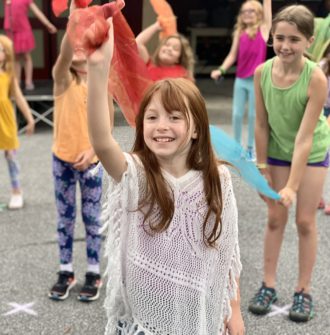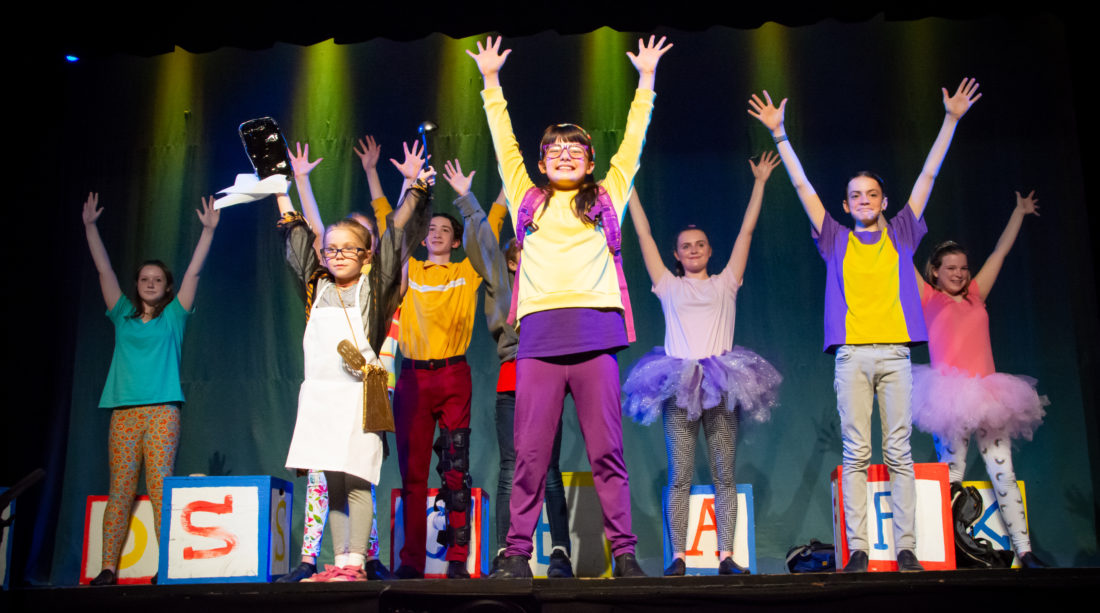Chase Brock, a choreographer for Broadway and London’s West End, got his start as a student and young performer at the Flat Rock Playhouse, and the TV/film actor Jimmi Simpson (Netflix’s “House of Cards”) was once an apprentice as well.
But for Anna Kimmell, director of education for FRP’s education wing, Studio 52, one need not pursue a life in the performing arts to be considered a success.
“A ‘success story’ at Studio 52 is anyone who finds their voice, improves their confidence, builds community or discovers joy through a theatrical experience. In that regard, we witness success stories nearly every day,” Kimmell says. “We believe that no matter what career our students pursue, the arts make them more compassionate, confident and creative members of society.”
That focus on youth development over superstardom is likewise a cornerstone of Asheville’s The Montford Moppets and Burnsville-based Parkway Playhouse, all of which have doubled down on their commitment to educating future generations during these challenging past two years.
Reading the room
Operating from the Hazel Robinson Amphitheatre, The Montford Moppets, a youth-led program, prides itself on helping students claim ownership of their creativity by providing opportunities for them to problem-solve, collaborate and create.
For nearly a decade, the Moppets were part of the Montford Park Players’ education department with performances limited to a single show each summer. But according to Moppets artistic director Ashleigh Goff, over the last five years, show and class offerings have tripled, and in 2020 the Moppets incorporated as its own theater company.
“This year, we’re doing four main-stage shows, two design classes, a film class centered on the horror genre and our first Moppets alumni production,” Goff says. “We’ve grown so much, and we’re just getting started.”
Meanwhile, Parkway Playhouse is currently celebrating its 75th year of operation. Yet the company only started its programming for children and teens in 2015, beginning with two-three shows per year. Since then, it’s grown into a full selection of offerings for kids, including a range of classes, two productions, three summer camps and summer apprenticeship programs. There’s even a comedy improv troupe called Get the Hook.
“The biggest difference it makes in our students’ lives is their level of confidence,” says Jenny Martin, Parkway Playhouse’s director of education and outreach. “We’ve had multiple students over the years who took a class or auditioned for a play ‘just to try it’ and became hooked on theater. They now regularly audition for both youth and adult programming, and work in many capacities in the theater doing lighting and sound, performing and more.”
Renewed focus
All of the above, however, was turned upside down in March 2020 when local and statewide restrictions to curb the spread of COVID-19 negated in-person learning.
All three organizations shifted to online classes early in the pandemic and found varying degrees of success in this largely untested landscape. The virtual setting allowed Studio 52 to expand its reach and include students from across North Carolina. And after returning to meeting in person in 2021, Kimmel says she and her colleagues have reimagined day-to-day operations with outdoor classes and performances on FRP’s grounds.
The need to pivot similarly brought out the best in the Moppets. Goff notes that their young artists needed an outlet that they weren’t able to get anywhere during the pandemic’s initial months, so the educators attempted to re-create that community for them by transitioning to digital productions.
“We tried a lot of things in the beginning — and honestly, some didn’t work out so great, like rewriting Romeo and Juliet to fit the framework of the pandemic and politics,” she says. “But we also did some things that really worked, like our digital production of The Tempest. We asked individual Moppets to direct their own scenes in their own style, and the end result was beautiful.”
The Moppets have since returned to in-person rehearsals and shows, doing masked read-throughs and requiring all participants be vaccinated. Goff says that navigating the safety of students and families is tricky but not impossible, thanks to participants willing to work together. But even with the general return to normalcy, some of the programs the Moppets developed during the pandemic have stuck around, namely the horror anthology film, which Goff adds “has quickly become a favorite.”

“The pandemic forced us to think about more ways we can engage our mission with students,” she says. “We challenged ourselves to change and grow, and now we are able offer students more variety.”
The world’s a stage
As summer nears and operations get ready to crank up to their highest levels of the year, all three organizations are excited for their most ambitious seasons thus far.
Parkway Playhouse has begun rehearsals for The Addams Family, Young@Part, which runs May 13-22, followed by a summer camp production of The Little Mermaid, JR., July 11-22. The Moppets are offering three classes with guest teachers, including a special effects and stage makeup course with artist and Moppet alum Kai Strange. And Studio 52 will present an all-new West Side Story-themed camp that gives teens an exclusive behind-the-scenes look at FRP’s professional production of the beloved musical.
But through these fun activities, organizers remain mindful of their overall missions and how theater education can make a long-term impact on participating youths.
“Theater skills aren’t in a vacuum,” Martin says. “They enable children to collaborate with others, learn responsibility and dedication, use math skills such as measuring and geometry, and engage in public speaking.”
In her role as executive director for the Moppets, Rachel Cort says she takes responsibility for making sure that young people have a solid foundation from which to grow and that the organization continues to expand the audience they reach and the student populations that they serve.
“I have strong personal feelings about access to performing arts for all youth who might want to participate, and we do offer scholarships to anyone who needs one,” Cort says. “It’s important to me to protect that access, to build our scholarship fund and to connect with as many kids as possible who might be interested in performing or participating in theater but might have financial barriers to participating in other programs.”
Life lessons
Over time, Goff has seen every Moppet learn something new about themselves with each show through hands-on experiences with responsibility and accountability. She’s witnessed students in tears doubting their abilities, then watched that fear change to pride and a sense of accomplishment once they realize they’re capable of almost anything. “That’s truly the magic that theater creates,” Goff says, yet she and her colleagues’ aims reach far beyond Hazel Robinson Amphitheatre.
“More than preparing our Moppets for a career in theater, though, we try prepare them for a career in anything,” Goff says. “All of our students are collaborative, patient, responsible, adaptable and resourceful. We try to give our students the skills to handle the variables life throws at young adults. Over the years, our alumni have come back to visit and update us on what’s happening for them, and each one is a success story.”
The benefits aren’t limited to the kids, either. Kimmell says she learns as much from her students as they do from her, if not more, and that “their imaginations, kind spirits and varied perspectives” ground her in the present and give her hope for the future.
Martin is likewise confident about the difference theater can have on a young person and sees its impact on a daily basis in her own life. “Our students at Parkway are quite literally the future of our organization. I started myself as an apprentice/intern at Parkway at age 15, and now here I am, teaching theater at the middle schools in Yancey County and working as the education director at my very favorite place,” she says. “Some of my best friends, memories and lessons were learned and earned traipsing across that stage, and I want that for our students, as we laugh, learn, cry and create together.”
Furthermore, notes Kimmell, these programs continue to be a lifeline for many students during these challenging times. She feels that theater creates a space for collective healing where young people meaningfully connect with like-minded peers, channel and process their emotions, take creative risks, develop language, listening and communication skills, exercise empathy and build confidence.
“The mental, emotional and developmental toll the pandemic has taken on young people cannot be understated,” she says. “When a parent shares that their child has been ‘transformed’ or ‘brought back to life’ through theater, we’re reminded of how essential our work is to young people.”




Before you comment
The comments section is here to provide a platform for civil dialogue on the issues we face together as a local community. Xpress is committed to offering this platform for all voices, but when the tone of the discussion gets nasty or strays off topic, we believe many people choose not to participate. Xpress editors are determined to moderate comments to ensure a constructive interchange is maintained. All comments judged not to be in keeping with the spirit of civil discourse will be removed and repeat violators will be banned. See here for our terms of service. Thank you for being part of this effort to promote respectful discussion.